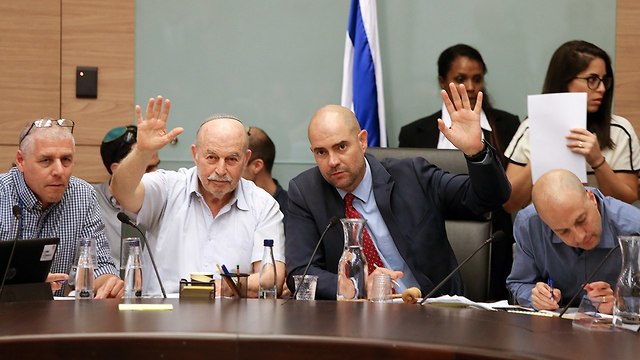

Shouting at Knesset committee over nationality bill
'How can you have a democratic process on an undemocratic bill?' MK Pnina Tamano-Shata wonders after MK Bezalel Smotrich seeks to add the word 'religious' to type of rights Jewish people have in Israel, while other MKs contend result of vote on one of the reservations.
A shouting match erupted at the Knesset's Constitution, Law and Justice Committee on Sunday during a vote on the controversial nationality bill.
Committee chairman MK Amir Ohana (Likud) decided to vote on all articles except for two contentious articles—5 and 7—which will be voted on at a later date.
During the vote, there was an uproar over a reservation submitted by Bayit Yehudi MK Bezalel Smotrich on article 1b, which says: "The State of Israel is the nation state of the Jewish people, in which it realizes its natural, cultural and historic right for self determination."

"How can you have a democratic process on an undemocratic bill?" Yesh Atid MK Pnina Tamano-Shata wondered.
Then, some Knesset members demanded to check the cameras to ensure the results of a vote on one of the reservations. The votes are done with each MK raising their hand to indicate they are either in favor or against the item being voted on.
The committee's legal advisor asked to vote again, but the opposition MKs objected.
MK Michal Rozin: "There was no revision, you're stealing (the vote on) this article."
MK Tzipi Livni: "You're stealing the country."
MK Yael German: "You can't say it passed when it didn't."
MK Rozin: "I ask that you bring the Knesset's legal advisor here. And show him the video."
Committee's legal adviser: "I want to make it clear: There were claims the counting was incorrect. Including of MK Sharren Haskel who wasn't in the room."
MK Rozin to Haskel: "Were you or weren't you here for the vote? There's video."
MK Ahmad Tibi: "Don't lie, don't lie. In any case, the reservation failed to pass. It was either a five to six vote, or a six to six, which is a tie. Sharren Haskel wasn't here."
MK Pnina Tamano-Shata: "It's not enough there's tyranny of the majority, there are also lies and deceptions, really. Unimaginable. Go to the Knesset Channel and check the video."
The nationality bill proposal, sponsored by MK Avi Dichter (Likud) among others, seeks to enshrine into law the status of the State of Israel as the nation state of the Jewish people.
This includes legally enshrining Israel's democratic character, its state symbols, Jerusalem as the capital, Hebrew as the official language and the right of return for Diaspora Jewry.
The Arabic language will receive a special status as Israel's second official language, but the law will not require to make state services accessible in Arabic as well.
An article allowing the establishment of Jewish-only communities remained, despite the objection of the attorney general and other parties.
Critics of the legislation claim the article dealing with the preservation of one's heritage, in its current wording, might allow the ultra-Orthodox, under certain circumstances, to receive an exemption from core curriculum studies—such as math, sciences and English—in their schools. This claim was rejected by some of the legislation's writers.
Some 2,500 people took part in a protest in Tel Aviv against the nationality bill on Saturday night, saying it is a racist and discriminatory bill.
The Knesset will convene on Monday for its last week of activity before the summer hiatus, but due to disagreements in the coalition, it is unclear whether the nationality bill will indeed go up to a vote in its second and third readings.
Minister Yariv Levin announced on Sunday morning an agreement is in the works regarding the problematic article 7b, which allows the exclusion of citizens from cities and towns based on their nationality or religion. According to Levin, the new wording, which is acceptable to the attorney general, will establish and strengthen Jewish settlement in a way that makes it clear the encouragement of Jewish settlement is a legitimate realization of the Zionist vision and does not constitute discrimination or inequality.
A few hours later, Bayit Yehudi announced they were opposed to the article, with officials in the party claiming it was not fulfilling the purpose for which the bill was made. Bayit Yehudi's objections to the new version also puts the vote in doubt.
 |

















